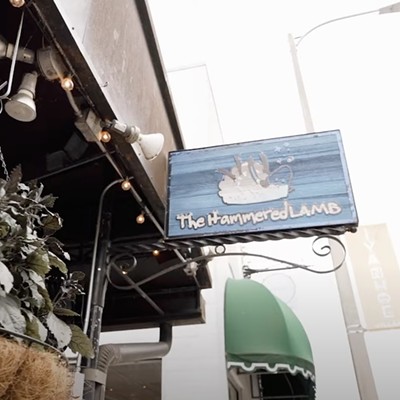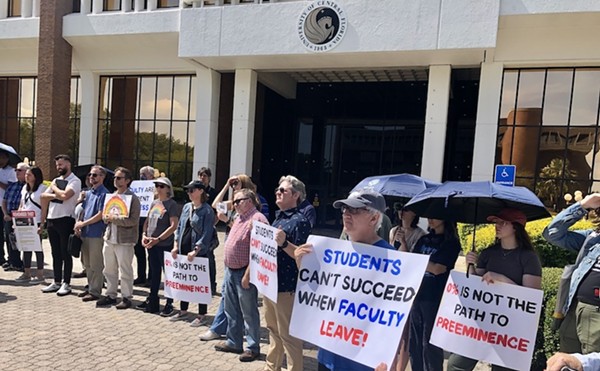The state of downtown Orlando at the end of 2001 is such that you can now lease a penthouse overlooking Lake Eola for $9,000 a month. But finding a decent place to eat breakfast remains an iffy proposition. You'll soon be able to test drive a $20,000 Mini Cooper S through downtown traffic. But you still can't window-shop for T-shirts and jeans. Orlando police issue tickets for indiscretions as simple as jaywalking across Orange Avenue on a Saturday night. But three blocks over, in Parramore, streetwalkers and hustlers are bold enough to hail anyone who might appreciate a $20 blow job or rock of cocaine.
If some of these items are holdovers from years gone by, so be it. Yet there's no denying that Orlando has changed in the past year, even as our attention was distracted by the first 100 days of George W. and the Sept. 11 tragedies. The city's own economic stimulus package, millions of dollars in subsidies handed out to developers two years ago, has begun to show signs of life. The Waverly Place apartments, home to the aforementioned penthouse, took its place next to two stately high-rises, bringing a contemporary dignity and 232 apartments to the south side of Lake Eola. Farther east on Central Avenue, the much-anticipated Thornton Park Central opened its doors to customers. The $25 million building is the kind of mixed-use development that turns city leaders giddy. When fully opened, it will contain 56 condominium lofts, a grocery store, a bookstore, offices for an architecture firm and covered parking. To give the development a boost, city leaders began operating an electric bus as a demo project that runs from Orange Avenue to 11 stops along Central Boulevard and into the increasingly upscale residential neighborhood east of Lake Eola Park.
Another mixed-use development, the $53 million West Church Street Development in Parramore, broke ground earlier this month. Hughes Supply, a Fortune 500 building-materials distributor boasting $3.3 billion in sales this year, will be the anchor tenant. The eight-story building will contain restaurants, retail space and 266 apartments, 106 of which will be reserved for low-income residents. At the groundbreaking ceremony, Mayor Glenda Hood took turns calling the project the "largest economic development," the "most significant economic development" and the "linchpin" of Parramore. District 5 Commissioner Daisy Lynum seized the opportunity to deride "naysayers" twice at the ceremony and at least once for the news cameras.
In truth, Parramore residents have been asking city officials to clean up the neighborhood for years. Only one commissioner, Don Ammerman, expressed concern when the project was brought to City Council: He was quickly shushed for commenting that the project was being rushed through city government with hardly a whiff of public input even though it will be subsidized with $12 million in public money. Shame on Ammerman for doing what taxpayers pay him to do.
Parramore finally received a school -- though it wasn't the school many residents wanted. City leaders puffed their chests and made all the proper acknowledgments to the black community. But when all was said and done, the school's enrollment contained few Parramore kids, defeating the ostensible purpose for building it.
As a sign of how poor the school's concept was -- it changed locations three times in a single year -- city leaders unveiled a plan to move it again three months after it opened. The plan was part of a larger revitalization effort involving the 60 acres around the T.D. Waterhouse Centre. It calls for a new hotel, a new auditorium to replace the Bob Carr Centre and areas for parking garages and retail. There's also space for another arena, assuming the Orlando Magic can convince the public that one is necessary. The team, of course, has tried. They flew a passel of local dignitaries to Indianapolis to check out that city's arena. But by year's end, nothing new had materialized, and public officials were watching how they worded their sentences for fear of being labeled arena spendthrifts.
2001 was also a year for departures. Barrie and Tommy Freeman, who turned a desolate corner of Orlando into a thriving coffee-shop and nightclub complex as owners of Yab Yum Inc., sold their interest in three bars to a fellow tavern owner. Their departure left many in the avant-garde community wondering where the young and the tattooed might socialize. The anxiety was increased when Jim Faherty stepped down as owner of Sapphire, downtown's preeminent live music club. Faherty's departure appears to be more cosmetic than substantial. The club changed its name to The Social, but Faherty continues to book gigs and hang out.
Tom Kohler announced he will retire after 22 years as executive director of the Downtown Development Board -- the city agency responsible for all things downtown, from subsidies to the Farmers' Market. Most people in the know maintain that Kohler has done an admirable job. He oversaw the overhaul of Orange Avenue and the construction of the arena in the 1980s, as well as five large residential apartment complexes (including the Waverly) in the late 1990s. Still, there were whispers that maybe it was time for a change if for no other reason than that downtown needs new ideas and a new perspective from time to time. A search committee has met twice, eliminating a dozen hopefuls from a stack of resumés. A decision on Kohler's successor is expected by the end of January.
Even with the additions and subtractions, the feeling remains that something isn't quite right with downtown. The city's office towers boast a 95 percent occupancy rate. But street level shops still suffer, especially along East Robinson Street.
Church Street Station, the hokey, country-and-western attraction that at one time was a huge tourist draw, went from bad to worse. At the end of 2001, the entertainment relic was all but abandoned. A chain and padlock blocked the main entrance, not to mention 60 banquet workers unceremoniously dumped a week before Christmas. A banner hanging over The Cheyenne Saloon, where Merle, Dottie and Garth once played, declared that the bar was closed for renovations. The Station's owners, who failed to return phone calls, have agreed to allow a theater group to lease space for the next couple of years.
The status of another vacant eyesore in the center of downtown, the so-called Jaymont block, also remained stagnant. A British billionaire and Canadian residential developer purchased the block along Orange Avenue last year and have discussed building a 28-story apartment tower and 20-story office building. Any new development, however, must first meet the approval of historic preservationists. Jaymont, which begins with the McCrory Building and ends with the long-gone Terror on Church Street, sits in an historic district.
City government can't do much about those two privately owned properties, such as they are. But it has tried to shore up the dearth of downtown retail. In spite of offering hundreds of thousands of dollars in subsidies, though, no new shops have opened. The Downtown Development Board has commissioned a population survey that it hopes will entice retailers to downtown, reversing a trend that began in the 1950s when big department stores bolted for Colonial Drive and the suburbs. City leaders expect new shops to open as the downtown population increases.
The political landscape also changed in downtown, though 2001 wasn't an election year. Thanks to the redistricting process, downtown is now represented by a single city commissioner. If you have a complaint that the mayor's office ignores -- a jaywalking ticket, say, or the desire to drink alcohol after 2 a.m. -- downtown's only city commissioner is but a phone call away. This convenience, however, comes with a drawback. The city commissioner is Daisy Lynum. Watch what you say to her, or -- like those phantoms of Parramore -- you risk being labeled a naysayer.

















